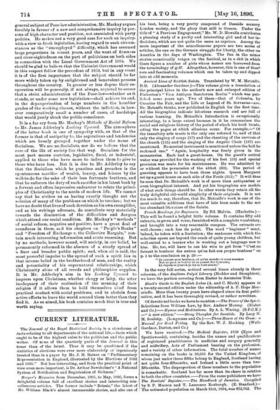Ancient Lives of Scottish Saints. Translated by W. M. Metcalfe.
D.D. (Alexander Gardner.)—This volume gives a translation of the principal Lives in the author's new and enlarged edition of Pinkerton's " Vitas Antiqute Sanctorum Scotia:: " which was pub- liehed some years ago. Two of them—that of Columba, by Cuimine the Fair, and the Life or Legend of St. Servanus—are, Dr. Metcalfe thinks, now published in English for the first time_ All the biographies indicate laborious research and are full of various learning. Dr. Metcalfe's Introduction is exceptionally interesting, to a large extent because in it he summarises the social and religious history of the period of which his book treats, citing the pages at which allusions ocenr. For example,—" Of the transitory arts music is the only one referred to, and of that only the singing of songs (57) and the chanting of the services of the church (155) and the singing of the Angelic Choir (187) are mentioned. No musical instrument is mentioned unless the bell be reckoned one." "Again, hospitality was freely given in the monasteries. Each had a guest-house. On the guest's arrival water was provided for the washing of his feet (G3) and special provision was made for his maintenance. He was admitted by or without the permission of the abbot (59). The period of guesting appears to have been three nights. Queen Margaret setup a guest-house on each side of the Forth (312)." It will thus be seen that Dr. Metcalfe's work is of more than antiquarian or even biographical interest. And yet his biographies are models of what such things should be. In other words they retain all the truly delightful old-world simplicity of their originals. It is not too much to say, therefore, that Dr. Metcalfe's work is one of the most valuable additions that have of late been made to the not too abundant liter.iture of the Saints.






































 Previous page
Previous page